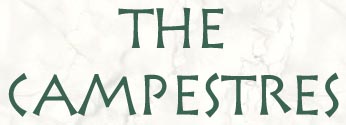
The Campestres are a group of Goddesses of the practice or training grounds, honored especially by the equites singulares, or Imperial horse guards. The equites singulares were instituted in the late 1st century CE; they were based in Rome, but had many members from further afield, such as Gaul or Germania. The Campestres get their Latin name from a word for a ‘level, flat field’; the word is also related to Latin campus, ‘a plain or open space for battle’ (which yes, gives us the English campus, referring to the grounds of a college or university). But of course They were not originally Roman; They were brought to Rome from Gaul and the German provinces by the equites singulares, in much the same way that the Gaulish horse Goddess Epona was (and indeed, Epona also has associations with the training field and the cavalry). They are always mentioned in the plural, and the assumption is that Their number is three, as most of the other plural Gaulish Goddesses, such as the Matres (‘the Mothers’), are. In Celtic thought, tripling a Deity serves to emphasize and expand their powers—three perhaps being a shorthand for ‘all’ or ‘everything’. In time, the worship of the Campestres spread far afield, not only to Rome proper but to Britain, Spain, and northern Africa (though in Africa They were called the Dii Campestres, ‘the [male] Gods of the practice fields’). The training fields (or practice fields, or parade grounds) were part of every decent-sized Roman fort; it was where the soldiers and cavalry trained, practiced, received orders, and assembled for certain religious rites (such as dedicating altars). The Campestres in some inscriptions were called the Matres Campestres, ‘the mother Goddesses of the training fields’, and that would imply that They had fertility and healing aspects, as the (many) Matres of Gaul and Germania are typically shown with babies, or baskets of fruit or bread. The Campestres, being worshipped almost exclusively by the horsemen (as opposed to the foot-soldiers) would then have watched over the safety and health of the soldiers and their horses, both on the practice ground and the actual battlefield. The Campestres are also known as the Matres Campestres (‘Mothers of the Fields’) and the Fatae Campestres (‘Fates of the Fields’). |
|
|



